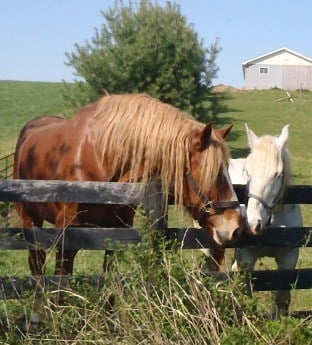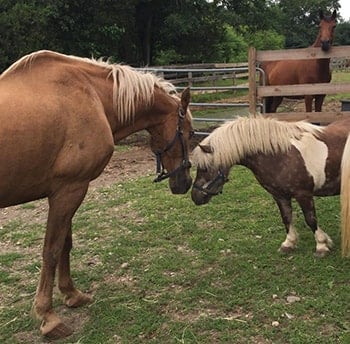Caring for Your Senior Horse Until the End
 I was at a friend’s baby shower when the call came…
I was at a friend’s baby shower when the call came…
My 29-year-old quarter mare, Chestnut, was in distress.
The vet was already at the farm.
Surely you know that heart-wrenching feeling from this type of phone call… the flash of worry... the reel of worst-case scenarios playing through your head....
9.9 times out of 10 -- things are fine.
Maybe your horse threw a shoe… he has a cut that needs stitches… he got into something he shouldn’t have… But. He. Is. Okay.
But then, the time comes when things aren’t okay.
And you’re suddenly forced into a nightmare.
In my particular case, I remember rushing to the barn along with my mom. We arrived to find our poor old girl laying down in the pasture. She was surrounded by people.
The stable manager Dana, her husband, the vet… and now me and my mom. We huddled around her huge mass talking about what to do to help her.
Earlier in the afternoon, Dana came out for an afternoon barn check. Just that morning, Chestnut was nickering, eating and acting normally. But, by the afternoon, she was laying down in her stall in clear discomfort.
Dana didn’t hesitate. She called the vet right away. And then called me.
Once the vet arrived, they managed to get her onto her feet and out to the pasture where there was more space. Chestnut laid back down and that’s where we found her when my car rolled up the drive.
Horses belong on their feet. So, with lots of pulling and pushing, the five of us helped heave her back onto four legs so she could walk around the open space.
The whole time, the vet was looking her over with a critical eye.
I was present but feeling kind of dazed.
It had only been a few short months since we went on our last ride together. I remembered Chestnut kicking up her heels and even throwing a characteristic “farting buck” to show her joy. She seemed fine.
Old, yes… but happy and healthy. She was living out her retirement the best way possible. Enjoying the sunshine, munching on the lush green pastures and eating up the love and attention we lavished upon her.
It was well deserved after a life of faithful service -- 4-H shows, trail rides, and hours of companionship out at the barn.
Today, things were changing...
After walking her around the circle a few times, Chestnut couldn’t go any farther. She slowly surrendered her balance and sank back down to the ground.
By this point, we were certain she wasn’t colicking. The vet was doing a series of tests and determined that her kidneys were failing.
There was nothing we could do.
No surgeries. No special treatments. No cutting edge therapies.
She was old and this was her natural end.
My mom and I made the decision to give her peace through humane euthaniasia.
It was one of the hardest things I’ve ever had to go through.
(And yes, this is incredibly hard to write.)
So, why write it?
Well, I’m hopeful this story will help you think about your own senior horse. What plans or changes can you make now to ensure they are comfortable and well cared for into their golden years?
And what decisions can you make now… so when the time comes you are well prepared?
Let’s look at a few of these topics one by one.
When Is Your Horse Too Old to Ride?
This first question is one that has a different answer for every individual horse. There’s really no hard and fast rule.
For Chestnut, we knew that she had some arthritis although she never presented as lame. Still, as she got older we slowed down year by year.

Most of her rides in her last years were just walking. We also limited the amount of weight she would carry. No heavy riders for our old girl.
Different horses have different lifespans. For some hearty breeds, living into their 30s is normal. For others, a horse who is 20 might be considered old.
You should also consider what type of work they did in their life. A racehorse who goes through intense training has more wear on their body than a horse used for pleasure riding his whole life.
Body condition is another important factor. How “fit” is your senior horse? Do they show signs of weakened muscles, low body weight, or frailty? Think about your rider’s weight. Don’t put a heavy rider on an older horse who might not be able to handle the load.
As horses age, they naturally lose body muscle and bone density - just like humans.
So, talk to your vet about your horse’s particular case. And consider switching to a senior feed to help them maintain a healthy body.
Watch for These Common Issues in Senior Horses
Just like with humans, certain health conditions are more likely to affect senior horses. Watch out for signs of these common problems and be sure to seek medical advice from your vet.
Cushing’s Disease - An endocrine disorder resulting in a long and curly coat that doesn’t shed correctly, a pot belly, increased drinking, sweating, and urination. Recurrent infections like laminitis and foot abscesses are also common.
Kidney Failure - Water and weight retention can be a big concern here.
Dental issues - Older horses may have trouble accepting the bit or eating food due to dental pain.
Weight Loss - Trouble eating results in trouble keeping weight on some senior horses. Issues with food digestion leads to other concerns like diarrhea, muscle atrophy, sway back and loss of strength.
Soundness - Arthritis and lameness are common in older horses who have spent their lives being worked.
Create an End-of-Life Plan
It’s really hard to think about, but making a plan before tragedy strikes does help. We had no such plan, so we had to deal with many decisions while going through our grief.
Some things to think about in advance:
-
When is life-saving surgery a good idea and when is it too much for your aging horse to endure?
-
If euthanisia is required, how and where would this take place?
-
What will you do with your horse’s remains? Burial on a private farm may be possible if it’s legal in your municipality. Cremation is another option and can be expensive.
-
Should you have an autopsy performed?
-
If your horse needs to be put down, do you plan to be there, or do you need a trusted friend or trainer to step in to add support?
-
Do you have memories of your horse saved? Collecting a lock of mane or tail hair is much easier if you do it years in advance.
Overall, losing a senior horse is incredibly hard. Still, it’s a small price to pay for the beautiful lifetime of companionship and riding you’ve shared together.
Talk with your vet about caring for your senior horse so you can make the best decisions for your particular animal.

